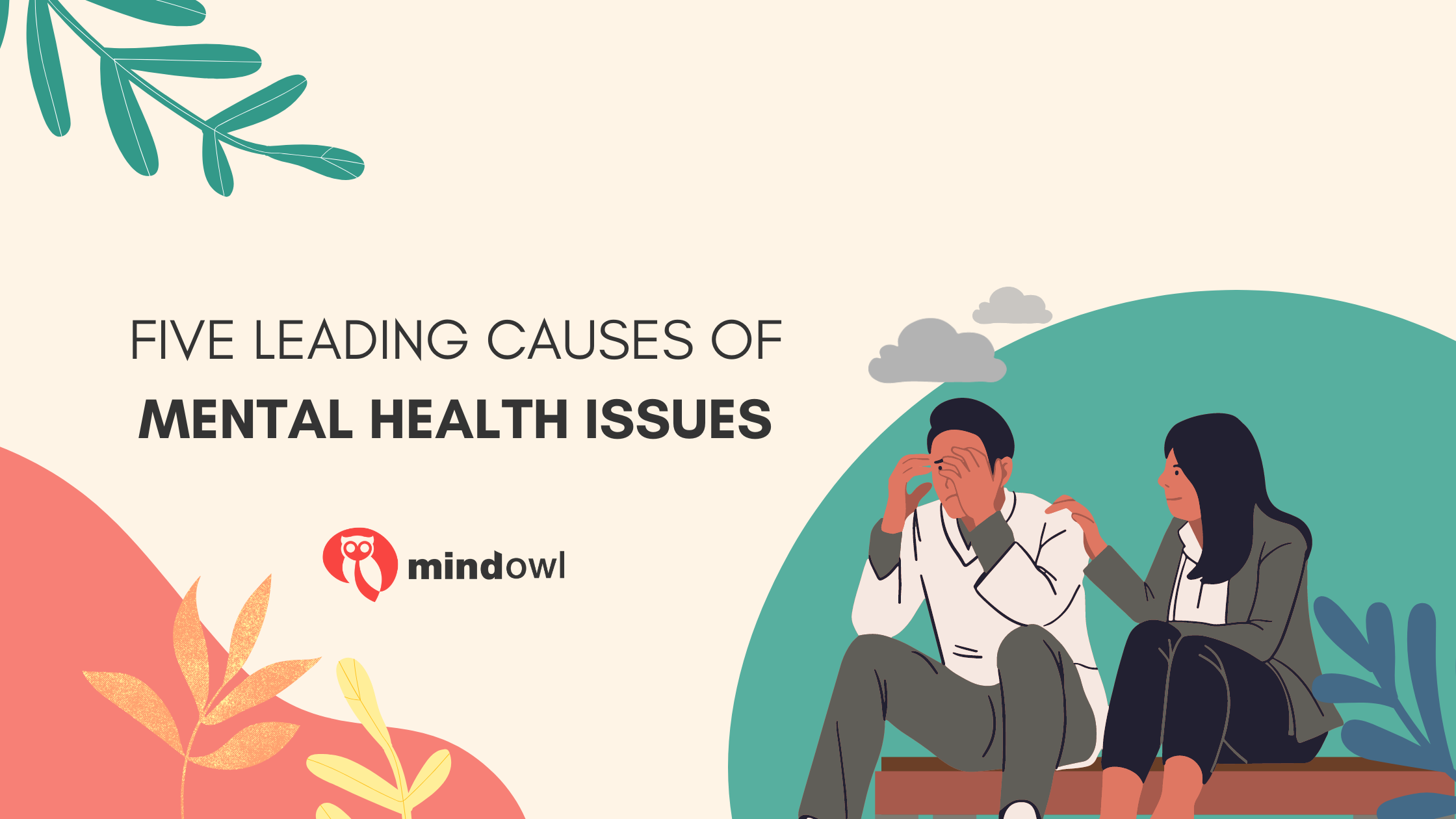Did you know that mental illness is one of the top causes of disability in the world? In fact, it is estimated that around 450 million people suffer from some form of mental illness. This can include anything from depression to anxiety to schizophrenia and bipolar disorder. If we are to effectively tackle mental illness, it is important to understand what causes it. It’s only by studying and identifying potential causes that we can hope to find ways to prevent them.
It’s important to mention that everyone’s experience with mental illness is different. What might trigger a mental illness in one person may not have the same effect on another. It’s also difficult to say that one single thing causes mental illness. In most cases, it is likely a combination of several factors: genetic, psychological, and environmental.
What are the most common mental illnesses?
Mental illnesses are incredibly common, with 50% of people having experienced a mental illness or disorder at some point in their lifetime. In the United States, nearly one in five adults suffer from a mental illness in any given year.
The most common mental illnesses include:
- Anxiety disorders
- Depressive disorders
- Eating disorders
- Obsessive-compulsive disorder
- Post-traumatic stress disorder
What are the Causes of Mental Health Issues?
The study of mental health is quite recent in human history, so we don’t yet know everything about what causes mental illness. However, experts have identified a number of potential causes. These include genetic, psychological, and environmental factors. It’s likely a combination of these factors contribute to the development of mental illness.
1. Abuse
One of the most well-known causes of mental illness is abuse. This can include physical, sexual, emotional, or verbal abuse and can also involve bullying or neglect. Abuse can occur in childhood or adulthood. Unfortunately, it is all too common. One in five women, one in six children and one in twenty men will be victims of sexual abuse at some point in their lives.
When abuse is experienced in childhood, it can have a profound and lasting effect on mental health. Children who are abused are more likely to develop anxiety, depression, post-traumatic stress disorder, and other mental illnesses. They may also be more likely to turn to substance abuse as a way of self-medicating.
In adulthood, abuse can also lead to mental illness. Victims of domestic violence, for example, are more likely to suffer from anxiety, depression, and post-traumatic stress disorder. Substance abuse is also closely linked to mental illness. People who abuse drugs or alcohol are more likely to suffer from depression, anxiety, and other mental disorders. The use of substances is common in those who are going through difficult experiences which only reinforces the cycle of abuse.
For this reason, here at Lantana Rehab Center in South Carolina they offer medical, mental, emotional and psychological tests before suggesting any sort of treatment or medical care options. Catering to the needs of the patients on every level from the medical to the psychological are most important. This allows finding the root of the problem before finding the best solution to put an end to the cycle.
2. Mental Illness In The Family
Mental health issues are often seen as belonging to the realm of psychology, but recent research has shown that genetics plays a significant role in many mental disorders. In fact, according to the National Institute of Mental Health, approximately 50% of all mental illness is caused by inherited genetic or biological factors.
This means that if you have a blood relative with a mental illness, you are more likely to develop one yourself. Mental illnesses tend to run in families, so it’s not surprising that genetics is a cause. Some mental disorders with a strong genetic component include depression, bipolar disorder, and OCD. While the precise mechanisms underlying these disorders are still being studied, it is clear that genetics plays a major role in their development.
Of course, just because you have a family member with a mental illness does not mean that you will definitely develop one yourself. This is where the environmental factors come into play. Although one can have a predisposition to mental illness, it does not mean that one will necessarily experience it. While some environmental factors can increase the risk of mental illness, others can actually protect against it.

3. Experiencing Discrimination and Stigma
People who have experienced discrimination or stigma are more likely to develop mental health concerns. This is especially true for groups who experience systemic discrimination, such as minority groups, people of colour, the LGBTQIA+ community, and people with disabilities.
Discrimination can take many forms, from microaggression to full-blown hate crime. It can be overt or covert, intentional or unintentional. Regardless of its form, discrimination can have a significant impact on mental health.
When individuals experience discrimination, it can lead to feelings of shame, worthlessness, and isolation. This can in turn lead to a mental health disorder such as anxiety, depressive episodes, and post-traumatic stress disorder. It can also trigger or worsen existing mental health conditions. In some cases, it can even lead to suicide.
Additionally, discrimination can make it difficult to access mental health services, which can further the problem. This is why it’s so important to address discrimination and work to eliminate it.
4. The Loss Of A Loved One
The death of a loved one is one of the most difficult experiences a person can go through. It’s natural to feel grief, sadness, and anger when someone close to you dies. However, for some people, these emotions can become so intense that they develop depression or anxiety.
In some cases, the death of a loved one can be sudden and unexpected. This can make it even more difficult to cope. Sudden deaths can lead to feelings of shock and confusion, which can be very distressing. Loved ones are usually those who give our lives meaning and purpose. So when they’re gone, it can be hard to find a reason to keep going.
Moreover, the death of a loved one can lead to feelings of isolation and loneliness. This is especially true if the person was a close friend or family member. When someone dies, it can feel like a part of you has died with them. This can make it hard to connect with other people and can create a vicious cycle of isolation and mental illness.
5. Trauma
All types of traumatic events can lead to a mental health disorder including war, natural disasters, rape/sexual assault, physical assault, bullying, neglect, and having a history of abuse or abusive life experiences.
Trauma can have a profound impact on mental health. It can lead to symptoms such as post-traumatic stress disorder, flashbacks, nightmares, anxiety, and major depression. Trauma can also make it difficult to trust other people, which can lead to social isolation.
Some people who have experienced trauma may also develop substance abuse problems as a way to cope with their pain. This can further compound the problem and lead to a downward spiral of mental illness and addiction.
Traumatic events don’t always need to be the big, life-altering events that we typically think of. Sometimes, it can be the accumulation of small, daily life traumas that have a significant impact on our mental health. This is especially true for marginalized groups who experience multiple forms of discrimination and violence.
Conclusion
While it’s hard to say definitively what the top five causes of mental illness are, the above factors certainly play a role. Mental health is a complex issue with many different contributing risk factors. Some of the most common causes include abuse, genetic factors, discrimination, grief, and trauma. What they all have in common is that they can lead to feelings of isolation, worthlessness, and despair. If you or someone you know is struggling with mental illness, it’s important to seek help. There are many resources available to those who need it. With the right support, mental illness can be managed and people can lead happy and healthy lives.
MindOwl Founder – My own struggles in life have led me to this path of understanding the human condition. I graduated with a bachelor’s degree in philosophy before completing a master’s degree in psychology at Regent’s University London. I then completed a postgraduate diploma in philosophical counselling before being trained in ACT (Acceptance and commitment therapy).
I’ve spent the last eight years studying the encounter of meditative practices with modern psychology.

